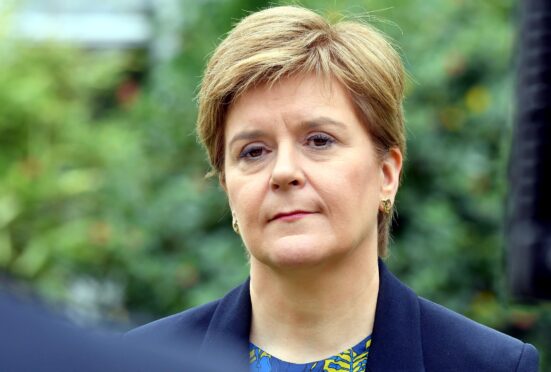
The November drizzle spitting down on the handful of doughty SNP MPs huddled outside the Supreme Court in London on Wednesday seemed as predictable as the final judgement being delivered inside.
The resounding legal opinion from the highest court in the land that the Scottish Parliament does not have the power to legislate for a second independence referendum did nothing to dampen the spirit of the nationalist politicians, who simply dismissed it as yet another Unionist block on their journey to independence.
“This changes nothing,” said one. “The arguments for independence remain the same.”
It is true that very few seriously believed the Supreme Court might deliver anything other than an unequivocal “no” to a referendum without the agreement of Westminster – which still begs the question of why Nicola Sturgeon really went down this route – but it does not alter the nationalists’ arguments for separation.
What has undeniably changed in recent days, however, is the language used to make those arguments and it is Sturgeon herself that has set this new tone describing Scotland as being held prisoner – an unwilling partner in a Union holding it captive.
She may have fought the law and the law won, but now she talks about “Westminster law” and the underlying message is no longer a legal one, but a political one about the injustice of where power lies, and one which encourages an ugly inclination in her support.
The way Douglas Ross, the leader of the Scottish Conservatives, was berated by independence supporters at last week’s rally outside Holyrood in response to the judgement, for having the temerity to be outside the parliament he was democratically elected to, was telling.
Democracy isn’t just one party’s preserve and if ramping up divisive, intemperate language on the basis of a catchy but basically meaningless slogan of “democracy denial” is unconscionable, seeing people being urged to burn copies of the judgement is, frankly, scary.
And for a party that has won favour with Scots by talking up the idea of a kinder, civic, inclusive nationalism, to now resort to a more torrid lexicon that talks of Scotland being trapped, shackled, and held against its will, is deliberately whipping up a particular faction into a frenzy of near insurrection.
That is surely the modus operandi of a Donald Trump not a Nicola Sturgeon, and yet the tone, the language, and the actions of recent days, belie the civic nationalism rhetoric that enamoured non-independence supporting Scots to repeatedly vote SNP.
That is the danger for Sturgeon as her next step is turning a general election into what she calls a “de facto referendum” – though no such thing exists – where she says that if her party (and potentially other independence supporting parties) achieve more than 50% of the vote, then independence will have to follow. Somehow.
I won’t be the only one who knows people that voted SNP in the last Scottish election not because they support independence, far from it, but because when it came to having confidence in who might be the most competent to run the country at the time, experience won out. That was bolstered by a first minister assuring voters that a vote for her, was not a vote for independence.
The SNP will go into a General Election with a one-line manifesto, independence. It will be up against a Labour party on the rise which will also be essentially campaigning on one issue but one with a clearer outcome and one only it can deliver. “Vote Labour, to oust the Tories”.
That’s a persuasive argument that will be difficult for Sturgeon to counter no matter the nature of the words she chooses to use.
Mandy Rhodes is Editor of Holyrood magazine holyrood.com, follow on twitter @holyroodmandy

Enjoy the convenience of having The Sunday Post delivered as a digital ePaper straight to your smartphone, tablet or computer.
Subscribe for only £5.49 a month and enjoy all the benefits of the printed paper as a digital replica.
Subscribe